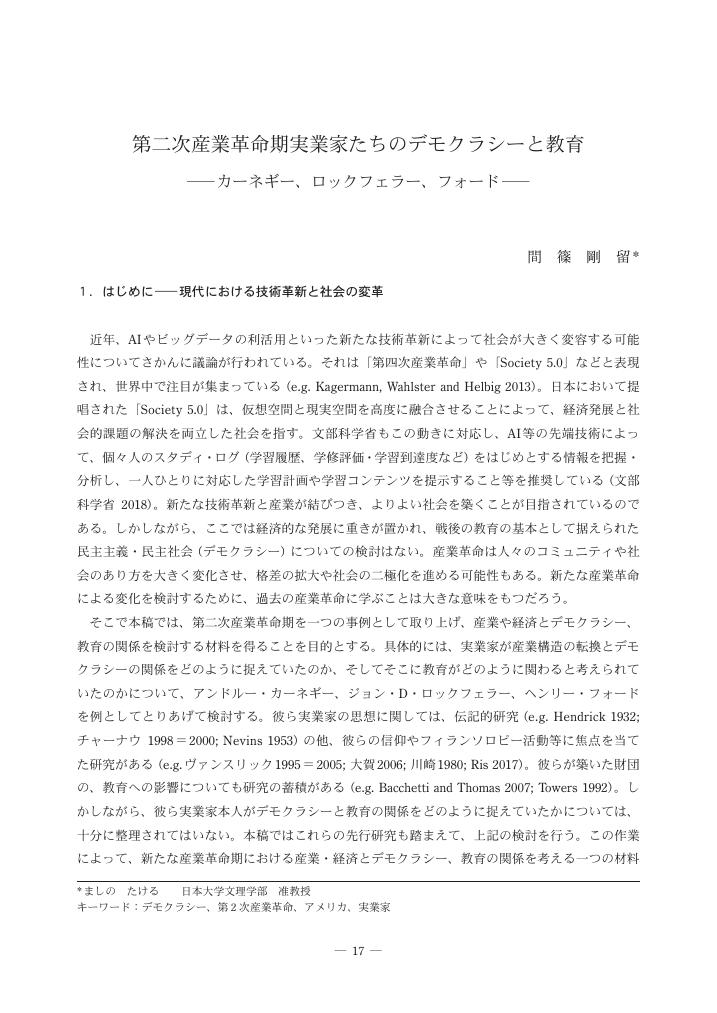4 0 0 0 OA 第二次産業革命期実業家たちのデモクラシーと教育
- 著者
- 間篠 剛留
- 出版者
- THE SOCIETY FOR EDUCATIONAL RESEARCH OF NIHON UNIVERSITY
- 雑誌
- 教育學雑誌 (ISSN:02884038)
- 巻号頁・発行日
- vol.57, pp.17-29, 2021-03-25 (Released:2021-04-09)
- 参考文献数
- 38
3 0 0 0 OA 広田照幸著『大学論を組み替える──新たな議論のために』 (名古屋大学出版会、2019年)
- 著者
- 間篠 剛留
- 出版者
- 日本大学教育学会
- 雑誌
- 教育學雑誌 (ISSN:02884038)
- 巻号頁・発行日
- vol.57, pp.53-56, 2021-03-25 (Released:2021-04-09)
- 参考文献数
- 5
2 0 0 0 IR ポスト・ボイヤーのスカラーシップ論
- 著者
- 間篠 剛留 原 圭寛 翟 高燕 塔 娜
- 出版者
- 慶應義塾大学大学院社会学研究科
- 雑誌
- 慶應義塾大学大学院社会学研究科紀要 : 社会学・心理学・教育学 : 人間と社会の探究 (ISSN:0912456X)
- 巻号頁・発行日
- no.79, pp.1-14, 2015
This paper examines how concepts of scholarship, especially scholarship of teaching and learning (SoTL) and scholarship of engagement (SoE), have developed among academic theorists based on Ernest L. Boyer's Scholarship Reconsidered (1990).To break out of the monotonous old debate of teaching versus research, Boyer attempted to redefine the meaning of scholarship. He proposed four types of scholarship -discovery, integration, application, and teaching— and insisted that they be equally respected. Since Boyer's proposition, many scholars have actively debated what scholarship is, and new concepts of scholarship, such as SoTL and SoE, have been developed.Recently, American scholarship has had two important tendencies: one is disaggregated, specific, and concrete; the other is aggregated, holistic, and abstract. Advocates of the former regard the new types of scholarship, such as SoTL and SoE, as extensions of one of Boyer's original four types. Hence, these advocates believe SoTL to be an extension of scholarship of teaching and SoE to be an extension of scholarship of application. These arguments provide concrete representations of scholarship, something that Boyer did not provide, and this helps people recognize the significance of teaching and learning or service and outreach. SoTL and SoE programs are useful in helping convince people that the work of teaching and learningshould be evaluated. Because the call for accountability is strong today and certain specialized appointees typically focus their energies on only one of the traditionally integrated faculty functions, administrators and scholars are likely to welcome new types of scholarship. This specific and concrete concept has succeeded in appropriately evaluating work that Boyer had earmarked for evaluation.However, this concept of scholarship contains a weakness that disregards Boyer's principles. If one sees SoTL and SoE as merely developmental ideas of the scholarship of teaching and the scholarship of application, and as programs or activities concerning them, the possibility of conflict among research, teaching, and service arises anew. Hence, another conceptual type of scholarship has emerged: the comprehensive type, which advocates regard as a construction of Boyer's four forms of scholarship or a principle for constructing them. In this way, scholars regard SoTL as scholarship that emphasizes teaching and learning and SoE as a form that emphasizes service. This new, comprehensive type of scholarship yields a critical perspective on specific types. Boyer offers the four types of scholarship as a common ground concept that all academic professions must share, and comprehensive scholarship advocates the importance of the types of thinking inherent in those four original types. Advocates of comprehensive scholarship attempt to reconstruct Boyer's four types flexibly, so that American academic professions can foster diversity and share common ground.論文
2 0 0 0 IR アメリカ高等教育におけるラーニング・コミュニティ : 思想史的研究(本文)
1 0 0 0 OA ポップカルチャーの教育思想(コロキウム8)
1 0 0 0 OA テクノロジーの進歩と社会的分断の時代におけるデモクラシーと教育 -米国の経験とこれから-
- 著者
- 古田 雄一 間篠 剛留 石嶺 ちづる 岸本 智典 福野 裕美 原田 早春
- 出版者
- 一般社団法人 日本教育学会
- 雑誌
- 日本教育学会大會研究発表要項 (ISSN:2433071X)
- 巻号頁・発行日
- vol.80, pp.87-88, 2021-08-16 (Released:2021-10-22)



